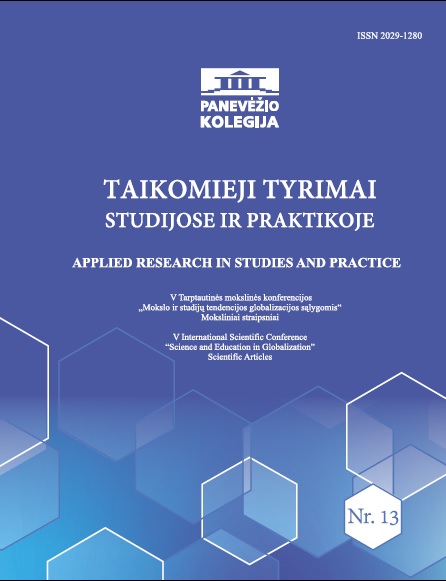COOPERATION OF PUBLIC HIGHER VOCATIONAL SCHOOLS WITH SOCIO-ECONOMIC ENVIRONMENT IN THE CONTEXT OF BUILDING SOCIAL CAPITAL
COOPERATION OF PUBLIC HIGHER VOCATIONAL SCHOOLS WITH SOCIO-ECONOMIC ENVIRONMENT IN THE CONTEXT OF BUILDING SOCIAL CAPITAL
Author(s): Artur ZimnySubject(s): Education, Vocational Education, Socio-Economic Research
Published by: Panevėžio kolegija
Keywords: public higher vocational schools; socio-economic environment; cooperation; social capital indicators;
Summary/Abstract: The relationship with socio-economic environment is becoming an increasingly significant aspect of operating of public higher vocational schools. It is doubtless that these schools cannot function like islands isolated from their environment. Cooperation with the environment are relations with enterprises, government and self-government institutions, non-governmental organisations, the media and inhabitants of cities and regions where these schools are located. Particularly significant is regional dimension of this relationship, associated with the aforementioned location of schools. The model of regional development in Europe is transforming into one where regions are becoming increasingly interdependent and they can rely less and less on traditional, compensatory or matching, functions and funds of the State. Therefore, they must compete with one another even fiercer. The key factor within this competition is social capital shaped by universities located in particular regions.The article presented and showed the analysis of the level, forms and effects of cooperation of public higher vocational schools operating in Poland with their socio-economic environment, and, more specifically, with territorial self-government units (cities, districts, voivodships), in whose region these schools operate and with employers ( public institutions, private enterprises, non-governmental organizations) running business in the region of operating of the analyzed higher schools. Appropriate information was obtained during the survey which was carried out among university authorities, local authorities and employers from September 2016 to February 2017, by means of questionnaires consisting of several questions focused on the issues related to building social capital as a result of cooperation of higher schools with socio-economic environment.The results of the survey allow the conclusion that public higher vocational schools, to the largest extent, cooperate with public institutions and municipalities, while to the least with voivodship self-governments. When it comes to forms of cooperation of the analyzed schools with socio-economic environment, the most frequent are organizing practice placement for students, organizing joint conferences, seminars, science festivals, concerts, debates and discussion forums as well as consulting study programmes, including practice placement programmes for particular degree courses. The least frequently undertaken forms of cooperation are: conducting dual studies, conducting business incubator, technology transfer centre, technology park, trade cluster etc. and undertaking practical placement by academic staff in the aforementioned entities.In the respondents‘ opinion, cooperation of public higher vocational schools with self-governments, public institutions, private enterprises and non-governmental organizations contributes significantly to building partnership and mutual trust, shaping positive behaviours and attitudes towards cooperation, and it also influences building the sense of community in regional/local environment. It leads to a conclusion that this cooperation contributes to creating institutional links and social capital and to mutual learning, and in this way positively verifies the hypothesis adopted in the article, in the light of which, cooperation of public higher vocational schools with socio-economic environment contributes to building social capital in the regions where these schools operate.
Journal: Taikomieji tyrimai studijose ir praktikoje
- Issue Year: 13/2017
- Issue No: 1
- Page Range: 13-20
- Page Count: 8
- Language: English

